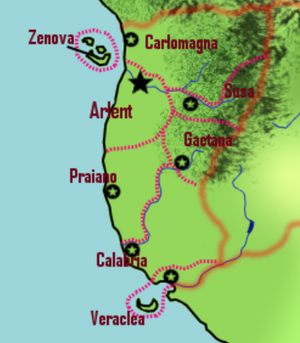Difference between revisions of "Abruzzo"
(added map & link to the Abruzzian city states) |
(added some subheadings) |
||
| Line 59: | Line 59: | ||
==Early History== | ==Early History== | ||
National History | ===National History=== | ||
Major Modern Events | ===Major Modern Events=== | ||
What events will have shaped the experience of characters having grown up there | What events will have shaped the experience of characters having grown up there | ||
Latest revision as of 05:06, 25 September 2022
Overview
High Level Overview of the place
Culture
Culture found in land
Religions
what faiths are present, what are the views on faith
Social Structure
Abruzzian social hierarchy is based not only on wealth, but on elaborate displays of that wealth. The primary way to display one's wealth is by surrounding oneself with artists in every variety. Painters, poets, bards, and all manner of creative souls are sought after by the Abruzzian elite, and any artist who is lucky enough to find herself a patron is set for life, or at least as long as she remains in favor.
Good breeding is essential for the Abruzzian elite, which applies not only to marrying within your class, but also within your race. Parents of all classes choose partners for their children to seal partnerships between family businesses, and try to (carefully) move of the social ladder. As Abruzzo is a predominately human country, members of other races find it quite difficult to prosper because they are seen as a waste of good Abruzzian business. They cannot marry to increase their social standing, and human competitors often try to undermine their ventures to take their businesses and increase their own wealth.
Customs and Holidays
What days matter to the people
Arts and Exceptionalism
Politics
Government
Abruzzo is less a unified country than it is a loose grouping of smaller states who share similar culture and values. Abruzzo is made of eight states comprised of their primary city and a swath of the surrounding countryside and smaller towns. Each city is officially run by a ruling council of representatives the wealthiest families of the city, but realistically there is a single family who is truly in charge of the operations of the city. The other families continually vie for power either by offering their loyalty to the ruling family, or by trying to undermine their power, or, quite commonly, both. The states frequently engage in infighting, though their armies are primarily comprised of large mercenary companies with little vested interest in the battles. The result is that most "battles" comprise the two companies meeting in the field, and essentially deciding which is stronger and would win the battle, and the weaker army surrendering to be bought back by the house that sent them. There is usually very little damage done to either company, and very rarely loss of life. Most of the infighting between states is this sort of posturing, and flaunting of their wealth, though some "battles" do result in the exchange of land as part of the purchase of their armies back.
Organization of the Land
How the power structure is divided regional (i.e. Duchies, Baronies, Lordships, etc.)
Demographics
Economy
Foreign Relations
History
History since the Dragon Wars
Early History
National History
Major Modern Events
What events will have shaped the experience of characters having grown up there
Geography
The physical lay of the land
